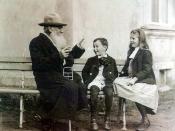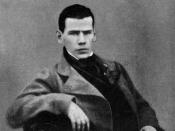Leo Tolstoy was a Great Russian writer and believed to be a great novelist also. He also was a great social and moral thinker, and later in life Tolstoy formulated a unique Christian philosophy, which put an emphasis on fair treatment of the poor and working class. Tolstoy spent most of his life at his family estate of Yashaya Polyana from 1828-1919. There he published eleven writings including Father Serguis, which I will be concentrating on throughout this paper. He also served in the army and traveled in Europe, starting a school for peasant children. 1 Father Serguis, written in 1898, is the story of Prince Stepan Kasatsky, who later in life gets the name Father Serguis. His mother entered him into a Military College as his father wished. While he was there Kasatsky became very well liked and was assured a promising career. Throughout his life, he experienced three life-altering events.
The breaking of his engagement to a maid, his encounter with a beautiful woman named Makovkina, and his temptation to a young merchant's daughter whom allegedly going to heal her.
While he is in the military, Kasatsky meets a beautiful maid and falls deeply in love with her. He wants to become a part of the inner circle or the highest society. That is his main goal while there. In order to obtain this great prestige he would have to become close with his Emperor or he would have to marry into it. He was planning on marrying that beautiful woman, however she told him a few weeks before the date that she had been the Emperor's mistress. Kasatsky felt betrayed by his Emperor and immediately broke off the wedding. He felt as if his future wife was angelic and pure. However, she wasn't that at all. All this despair led him to God. He entered a monastery and became a monk in order to be above those who thought to be his superiors. Kasatsky stayed in the first monastery for seven years. In his third year, he became part of the priesthood; there he adopted the name Father Serguis. Later, Serguis moved to another monastery. There he was faced with many temptations, and he was required not to fall into those temptations. Religion played a big role in not failing his monastery. He believed if he were to fall to temptation he would be betraying God and it would be considered sinful. After a short period of time he was not happy in this monastery and he was quickly moved to the Tambov hermitage where he became a hermit. 2 The second crucial event that happened in his life came in his sixth year of being a hermit. Serguis was sitting in his hut when a lady knocked at his door. She was complaining that it was wet outside and she would die if he didn't let her in. He tried to make her go away but she was persistent and wouldn't. When he finally let her in, she was a beautiful and eccentric woman named, Mokovkina. She was thin, her hair flowed on her shoulders, and she was very attractive. She had bet with her friends that she would spend the night inside with Serguis. And she was inside, now it was a matter of seducing him. Serguis, not paying any attention to her, she sat down on the bench and started taking her clothes off because it had been raining out. He walked over to an axe, took it off the wall, and laid his hand on the table and proceeded to chop off his finger. By doing that he showed his dedication to his hermitage and to his leader. He also did it because it acted as a distraction not to fall into the temptation that she wanted him to fall in, and to betray his God. He gets Makovkina to think about what she has done and why. He says to her, "Dear Sister, why did you wish to ruin your immortal soul? Temptations must come into the world, but woe to him by whom temptations comes. Pray that God may forgive us!"ÃÂ 3 They both nearly fell to each other's temptations and thus they fell sinful. About a year later, Makovkina entered a convent as a novice. She led to the strict life under the direction of the hermit Arseny. This incident spread across the people and how loyal he had been to his God. The people thought that he saved Makovkina by making her realize her sinful ways. He became very popular and soon people from all over came to see Serguis. He soon became a healer of God.
In his eighth year as a hermit, he cured for the first time. A fourteen-year-old boy was denied at the first visit. Serguis said, "that only God can heal the sick."à4 The next day they returned and his mother begged for his healing powers to be brought to her son. Serguis laid his hand on the boy's head and prayed. A month later the boy recovered. He did not really believe that he was a healer of God; he just went along with it because it brought people to his hermitage. After this, people started coming more and more. He held Vigil Services at his church. At this one particular service, a merchant came to Serguis and told him that his daughter had been ill. And he asked if he would be so kind to heal her. She was twenty-two years old and two years before this her mother died unexpectedly She was rather overweight and not very attractive at all. Serguis had confessed that he was attracted to younger women. He thought to himself, "Can I have fallen so low? "æ Lord, help me! Restore me, my Lord and God!"à5 For some unknown reason that he didn't realize at the time he had a feeling that he was going to fall for her temptations. No man can go without temptations unless you are strong willed or truly in love. She came into his hermitage, sat down and Serguis proceeded to ask her, what the problem was and how he could help her. She said, "I want you to pray for me and lay your hands on me. I saw you in a dream "æ put your hands on my breasts like that."à6 After the incident happened he felt as if he had broken the rules of the hermitage and proclaimed that she had been the devil. In fact, because she was not attractive, her beauty didn't tempt him, this was known as a weaker moment. There was so much temptation throughout his life built up that he was going to give in to any body that came to him. Not long after Serguis cut his long hair and went down to the river. There he thought about his childhood and his cousin, Pashenka. They were great friends when they were younger and he had to find her. So he became a peasant and proceeded to find Pashenka. He went door to door until he finally found her. When he finally arrived at Pashenka's house he was so glad to see her, as she was glad to see him. They both sat down and Serguis explained to her, "I am not a holy man, I am not even a good as a simple ordinary man, I am a loathsome, vile and proud sinner who has gone astray, and who, if not worse than everyone else, is at least worse than most very bad people, I am a adulterer, a murderer, a blasphemer, and a deceiver."à7 He asked her how she lived in this tiny house with her daughter, her daughter's husband, and their daughter. She told Serguis that her life was not pleasant at all, her husband beat her and she led a horrible life. However, she has made it because she believed in God. Pashenka thought she was working for the people and she was actually working for God, and Serguis thought he was working for God but he was working for the people. Serguis was so astonished by her answer that he knew what he had to do.
After leaving Pashenka's house Serguis led a very simple life. He lived in Siberia and became a well-to-do peasant. He moved because he knew if he went back to his old life that the cycle would start all over again. He didn't want to go through the pain again. That included working in the kitchen, teaching children, and attending to the elders. From Pashenka's life he learned that you don't have to be close to God in order for God to watch over you. He didn't try so hard to pray all the time, he let things be and he knew that God was there.
Tolstoy and Serguis' life are very similar and I think that he wrote this on a personal level. The three life altering events that happened in Serguis' life could have very well happened in Tolstoy's life. I will leave you with a quote that has great meaning to me, "I have thus lived for only ten years."ÃÂ 8 Endnotes 1. Internet, The Britannica Concise 2. Father Serguis, 327 3. Father Serguis, 341 4. Father Serguis, 350 5. Father Serguis, 360 6. Father Serguis, 362 7. Father Serguis, 365 8. Internet, Father Serguis Biography Bibliography 1. Leo Tolstoy, (1898) Father Serguis 2. Encyclopedia Britannica, Internet 3. Bibliography of Leo Tolstoy, Internet





